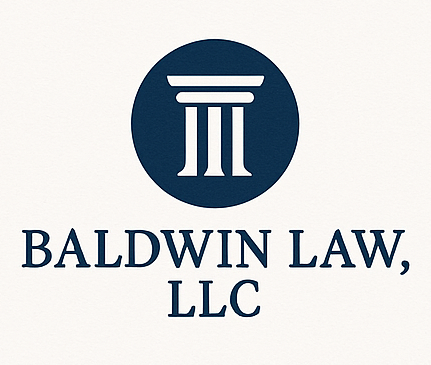What Is Small Claims Court? A Practical Guide for Everyday Legal DisputesBy Robert Baldwin, Esq. | Baldwin Law, LLC
Legal disputes don’t always require high-stakes litigation or complex courtroom battles. In fact, many everyday legal issues—like unpaid debts, property damage, or disputes between neighbors—can be resolved efficiently in small claims court. If you're considering filing a case (or defending one), this guide will give you a basic understanding of how the process works and what to expect.
What Is Small Claims Court?
Small claims court is a division of the county court system designed to handle lower-value civil disputes quickly and affordably, often without the need for attorneys. Each state sets its own monetary limit—in Florida, for example, the limit is $8,000 (not including court costs or attorney’s fees, if applicable).
This forum is ideal for:
Individuals or small businesses seeking payment for services or goods
Landlord-tenant security deposit disputes
Minor car accident claims
Unpaid loans between friends or family
Consumer issues involving faulty products or services
Who Can File a Small Claims Case?
Any individual, business, or organization can file a small claims case—so long as the amount in dispute falls within the jurisdictional limit. While you can choose to hire an attorney, many parties represent themselves (this is called appearing “pro se”). That said, consulting with a lawyer before you file—or if the matter becomes more complex—can make a big difference in the outcome.
How the Process Works
Here’s a typical roadmap of a small claims case:
Filing the Claim
You start by filing a “Statement of Claim” with the county clerk and paying a filing fee. You'll need to name the defendant, explain the basis for your claim, and request the amount owed.Service of Process
The defendant must be officially served with the court papers—usually by a sheriff or process server.Pretrial Conference
In Florida and many other states, a mandatory pretrial conference is scheduled, where both parties appear before a judge to explore settlement. If the case doesn’t settle, a trial date is set.Trial
The trial is informal but still governed by rules of evidence. Each side presents their story, submits evidence (like contracts, receipts, photos), and may call witnesses. The judge then makes a ruling.Judgment and Collection
If you win, the court issues a judgment in your favor. Collecting that judgment, however, may require additional steps—like garnishment, liens, or further legal enforcement.
Pros and Cons of Small Claims Court
Pros
✔ Quick and inexpensive
✔ Informal procedures
✔ Accessible to non-lawyers
✔ Encourages early settlement
Cons
✘ Collection is not automatic
✘ No right to jury trial in many states
✘ No appeals if you win (in some jurisdictions)
✘ May not cover emotional distress or punitive damages
Tips for Success in Small Claims
Prepare thoroughly: Bring organized documents, photographs, contracts, and anything else that supports your case.
Stay professional: Even though it’s informal, judges expect you to be respectful, concise, and focused on the facts.
Understand the law: Know what legal principle entitles you to the money or relief you're seeking.
Be realistic: Just because you're upset doesn’t mean the law is on your side. Evaluate your case carefully.
How Baldwin Law Can Help
While you don’t need a lawyer to file or defend a small claims case, working with one can significantly improve your chances—especially if the facts are disputed, legal issues are unclear, or the other side brings counsel. Whether you're trying to collect a debt, recover damages, or defend your rights, Baldwin Law, LLC is here to help you navigate the process with confidence.
Ready to Take Action?
Contact Baldwin Law, LLC today to schedule a consultation. We’ll help you assess your claim, prepare your case, and understand the next steps—whether you’re suing or being sued.
